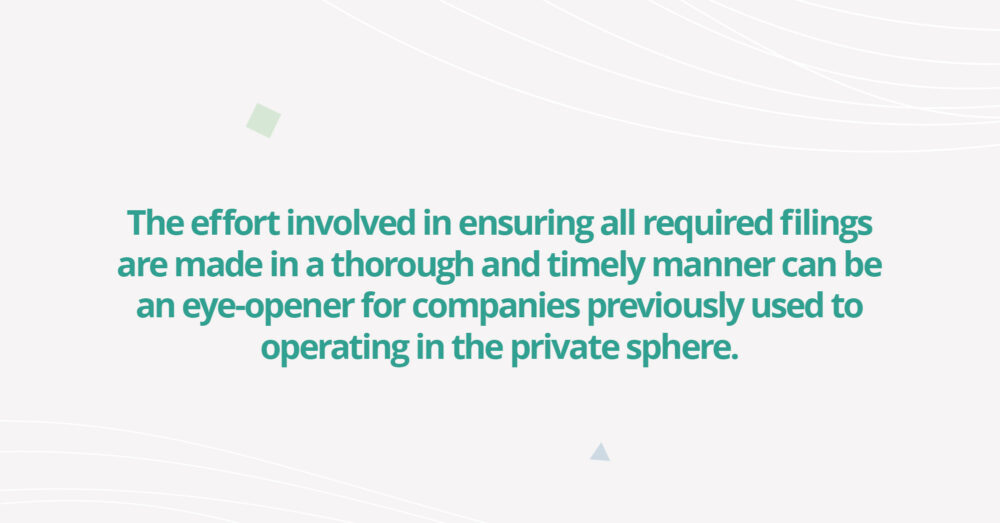When a private company is in the process of going public, among the demands it needs to adjust to are increased reporting obligations and the greater scrutiny associated with that.
Coming under Securities and Exchange Commission (SEC) oversight is part and parcel of the IPO journey, with any company transitioning towards becoming publicly traded needing to satisfy the regulatory body that it is meeting its obligations and abiding by the rules it agreed to sign up to when officially signaling its intent to go public.
Financial reporting and public companies
The effort involved in ensuring all required filings are made in a thorough and timely manner can be an eye-opener for companies previously used to operating in the private sphere, and while making it all the way to a successful flotation is undoubtedly an achievement that deserves to be marked and enjoyed, here is an important point to remember – your reporting obligations don’t end with the ringing of the bell on the first day of your company’s stock being traded openly on a public exchange. On the contrary, financial reporting is a fact of life for publicly traded companies. The SEC insists that companies under its oversight must file a variety of returns every year and may take a dim view when a business is late in meeting those obligations, depending upon the specific circumstances around a delay.
In essence, once a company files a Form S-1 registration statement, by which they formally declare their intention to go public, under the terms of the Securities Act of 1933, they become subject to reporting requirements.
Once they complete the process of becoming a publicly traded company, they then become bound by the rules around ongoing reporting set out in the Securities Exchange Act of 1934.

Challenges
Among the challenges for newly public companies is to a) understand how different life is as a public company, b) be prepared for the avalanche of filing obligations coming at you as you make what can be a difficult adjustment, and c) have the requisite knowledge on-hand in house to understand what is now expected of you, and, crucially, to file all reports within the timeframe specified by the SEC.
Also, it is important to understand what we mean when we use the term “SEC filings.” Put simply, we are mainly talking about financial statements and other formal reports that the SEC requires you to make public (via the online EDGAR portal) so that shareholders and the wider investing community have easy access to the information they need about your company and its financial performance in order to make informed investment decisions in the future.
Your filing obligations
So, what are the filing obligations that typically face public companies?
Form 10-K: Companies file their annual report with the SEC using Form 10-K. This document must be submitted within 90 days following your year’s end. It is a comprehensive and detailed piece of work, including information on, for example, the company’s corporate history, financial statements, leadership structure, executive compensation, and specifics on key quantifiable metrics such as earnings per share.
It will address other key business-related points such as what potential risk factors may be coming down the track, while also providing a forum and format through which management can discuss the results recorded for the year and place those figures into context.
Also, under the terms of the Sarbanes-Oxley Act (SOX), the company CEO and CFO are required to formally sign the 10-K to indicate that all information contained therein in accurate.
Form 10-Q: The 10-Q is perhaps best thought of as a condensed version of the 10-K. Whereas the 10-K is filed annually, the 10-Q will be filed for each of the first three quarters of the fiscal year. In practical terms, this means that the 10-K is filed after the fourth quarter, but will contain all relevant information for the full year, as opposed to just that final quarter, with no 10-Q required for that period.
SEC rules mandate that each 10-Q must be filed within 45 days after the end of each relevant quarter.
Each quarterly report will include detailed financial performance information for the three months in question, e.g., unaudited financial statements.
It is not unusual for investors to closely monitor 10-Q filings to assess fluctuations in various key business performance metrics.
Form 8-K: The 8-K is also known as a “current report” and is used to disclose information on significant events that take place in-between other filing deadlines and which shareholders have a right to know about. Whatever the significant event might be, companies are obliged to file an 8-K with all relevant details within four business days of that event taking place.
Examples of the events referred to in this form include: mergers and acquisitions, issuing of unregistered securities, changes to company bylaws, changes to the rights of security holders, and replacing your auditor.
While it is possible to secure deadline extensions on Form 10-K and Form 10-Q, the SEC offers no such latitude on Form 8-K.
Proxy statements: The purpose of proxy statements is to deliver new and essential information to shareholders more or less as it happens, using Form DEF 14A. The logic on this point is that shareholders need to be made aware of relevant information through appropriate channels and in a timely manner, as opposed to being taken by surprise by how and/or when they are made privy to it.
These statements will largely concern developments at executive and board levels, e.g., alterations in the make-up of the board and changes in executive compensation.
What about company insiders?
Aside from the documents referred to above, company insiders also face reporting obligations at an individual level. For SEC purposes, insiders are defined as all executive officers and directors, as well as any individuals holding 10% or more of registered securities.
Form 3, Form 4, & Form 5: These forms seek to ensure transparency on individual shareholdings and are also seen as a mechanism through which to discourage insider trading. Form 3 must be filed within 10 days of an individual becoming an officer, director, or beneficial owner of the business. Form 4 is the vehicle for reporting changes in ownership and must be filed within two days of those changes. Form 5 is used to provide details on transactions from earlier in the year that were eligible for deferred reporting or which should have already been included in a Form 4 filing. It must be filed within 45 days of year’s end.
Form 144: SEC rules insist that insiders must make a Form 144 submission in the event that they intend to sell more than 5,000 company shares or generate at least $50,000 from sales in an upcoming three-month period.
Schedule 13D: Scheduled 13D (also known as the Beneficial Ownership Report) comes into play when an individual acquires 5% or more of the company’s voting shares. The SEC requires several specific items of information in such filings, including, for example, the security and who issued it, the identity and background of the buyer, the cost of the transaction and source of those funds, and the purpose of the transaction.
Schedule 13G: The 13G is a shorter version of the 13D and can be used instead of it in certain circumstances, e.g., an institutional investor reaches 5% ownership, but has no intention of seeking to exert control over the issuing company.
What happens if you’re late?
While the path of least resistance is undoubtedly to look to ensure that all filings are submitted by the relevant SEC deadlines, sometimes life and business can throw up unexpected surprises and cause delays. Late submissions are best avoided, but won’t necessarily cause major problems, depending upon the extent of the delay.
When you are set to miss a regulatory deadline, you must file an official notification with the SEC – Form 12b-25. In this document, you will explain the reason for the delay and also specify any expected changes in operations and/or earnings for the relevant reporting period.
Completing and filing Form 12b-25 will trigger a filing extension – 15 calendar days for the 10-K and five days for the 10-Q. As mentioned above, no extensions are granted for Form 8-K.
As long as you file within the extension window, that will be the end of the matter as far as the SEC is concerned. They will treat the filing as being timely. However, if you miss the extended deadline, the SEC can take action, from looking to impose monetary or other penalties on the company and specific senior individuals up to and including the revoking your Exchange Act registrations.
Stay up to date
It is also important to remember that the SEC reporting regime can change over time. Your reporting obligations in the future might be at least subtly different to now and therefore make different demands of you. Part of the ongoing challenge you face is to ensure that you remain compliant over time, and that means always being aware of what is required of you.
One way to help ensure that you stay on top of the constantly evolving world of regulatory reporting is to work with a third-party whose job it is to know what the SEC want and when they want it at all times. Global Shares’ experienced team of dedicated personnel is standing by to assist you. Contact us today and let us put our knowledge to work for you.
By visiting a third-party site, you may be entering an unsecured website that may have a different privacy policy and security practices from J.P. Morgan standards. J.P. Morgan is not responsible for, and does not control, endorse or guarantee, any aspect of any linked third-party site. J.P. Morgan accepts no direct or consequential losses arising from the use of such sites.
Please Note: This publication contains general information only and Global Shares is not, through this article, issuing any advice, be it legal, financial, tax-related, business-related, professional or other. The Global Shares Academy is not a substitute for professional advice and should not be used as such. Global Shares does not assume any liability for reliance on the information provided herein.








